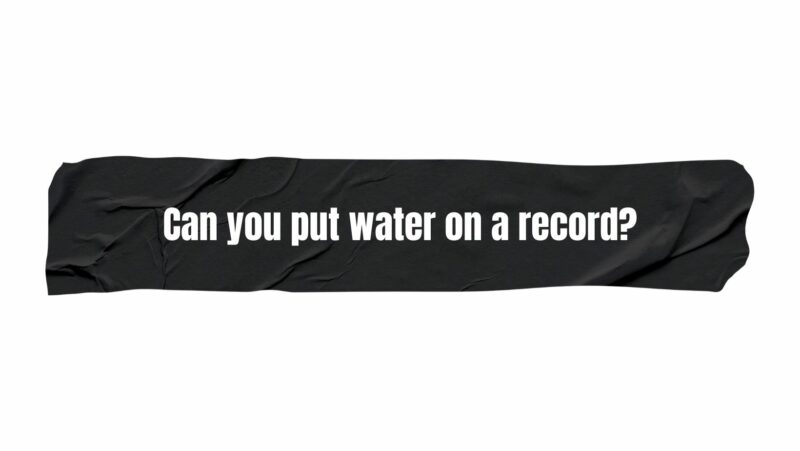Vinyl records hold a special place in the hearts of music enthusiasts, offering a tangible and authentic way to experience music. The distinct crackle as a stylus descends onto a vinyl groove, and the warmth of analog sound, transport listeners to a different era. However, the question of whether water can be used on a vinyl record remains a point of contention among collectors and audiophiles. This article aims to dissect this inquiry, exploring the potential risks, suitable scenarios, and best practices for using water on vinyl records.
Understanding Vinyl Records: To understand the impact of water on vinyl records, it’s essential to comprehend the intricate structure of these audio treasures. Vinyl records consist of polyvinyl chloride (PVC), a flexible material that can be affected by temperature changes, humidity, and liquid exposure. The grooves etched into the record’s surface hold the auditory information, and any disruption to these grooves can alter sound quality.
The Water Conundrum: Water, a fundamental element of life, can pose both benefits and risks to vinyl records. While water has cleaning potential, its interaction with vinyl records is nuanced. Direct exposure to water can lead to undesirable outcomes such as warping, mold growth, and degradation of the vinyl material. It’s crucial to navigate the use of water on vinyl records with caution.
Can You Use Water on Vinyl Records? The answer is yes, but with several important caveats. Water can be used under controlled circumstances for cleaning vinyl records, but it requires meticulous attention to detail and adherence to recommended practices. Water should never be poured or splashed directly onto a vinyl record, as this can exacerbate potential harm.
Water and Groove Damage: The grooves on a vinyl record are its lifeline, housing the intricate musical information that produces the desired sound. When water comes into contact with these grooves, it can disrupt their delicate geometry and alignment. This interference results in surface noise, skipping, and compromised audio quality.
Proper Cleaning Techniques with Water:
- Distilled Water: If water is used for cleaning, distilled water is the preferred option. Distilled water lacks impurities and minerals that can cause harm to vinyl records. It can be mixed with a specialized vinyl cleaning solution to create a gentle cleaning agent.
- Dilution Ratio: When mixing distilled water with a vinyl cleaning solution, it’s crucial to follow the recommended dilution ratio. The mixture should be applied sparingly to a lint-free cloth or cleaning pad, ensuring that excess moisture is avoided.
- Gentle Application: The mixture should be applied using a soft, lint-free cloth or a designated cleaning pad. The cloth should be moistened with the mixture, not dripping wet. Gently wipe the record’s surface in the direction of the grooves.
Precautions and Best Practices:
- Avoid Direct Contact: Never pour or splash water directly onto a vinyl record. Instead, apply the water-cleaning solution mixture sparingly to a cloth or pad.
- Limited Use: The use of water for cleaning should be limited to situations where other cleaning methods are inadequate. Water should not be the first choice for routine cleaning.
- Prompt Drying: After cleaning, ensure that the record is promptly dried using a dry, lint-free cloth. Excessive moisture should be avoided, as it can lead to potential damage.
- Storage and Protection: Store vinyl records in a cool, dry environment away from potential water sources. Proper storage can prevent accidental water exposure.
Conclusion: In the pursuit of preserving vinyl records’ integrity while maintaining their auditory charm, the use of water demands careful consideration. While water can be used for cleaning vinyl records under controlled circumstances, it requires adherence to precise techniques and best practices. The grooves that hold the magic of music are delicate, and their protection remains paramount. As enthusiasts continue to immerse themselves in the world of vinyl, an informed approach to water usage ensures the coexistence of pristine sound quality and the preservation of vinyl records for generations to come.


